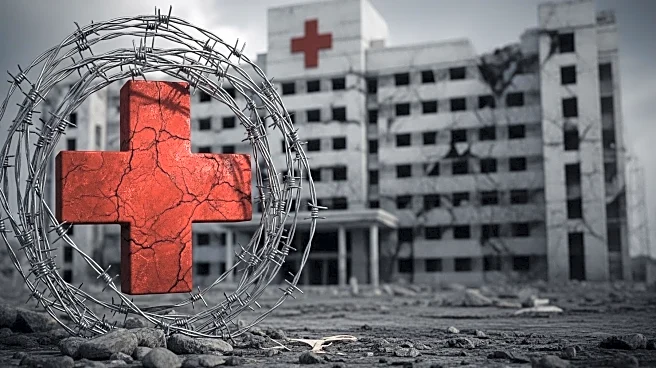What is the story about?
What's Happening?
Israeli forces have intensified their siege on Gaza City, leading to the collapse of its healthcare system. The ongoing ground offensive has resulted in the destruction of two clinics and the shutdown of two hospitals due to damage. The healthcare facilities are struggling with shortages of medicine, equipment, food, and fuel. Many patients and staff have fled, leaving only a few medical personnel to care for those too ill to move. The situation is exacerbated by bombardments and drone attacks, making it dangerous for people to access medical care. Al-Quds hospital, located at the southern edge of Gaza City, evacuated most of its patients as Israeli forces closed in. The hospital, once capable of accommodating 120 patients, now shelters only about 20, including two babies in intensive care. The United Nations reports that 27 other medical stations and primary healthcare centers in Gaza City have suspended or shut down services.
Why It's Important?
The collapse of Gaza's healthcare system has significant humanitarian implications, affecting thousands of civilians who rely on these facilities for medical care. The siege and destruction of hospitals not only endanger lives but also contribute to the broader humanitarian crisis in the region. The inability to provide adequate healthcare exacerbates the suffering of the civilian population, particularly vulnerable groups such as children and the elderly. The international community, including human rights organizations, has raised concerns about the targeting of healthcare facilities, which they argue violates international humanitarian law. The situation in Gaza highlights the urgent need for diplomatic efforts to address the conflict and ensure the protection of civilians and critical infrastructure.
What's Next?
As Israeli forces continue their offensive, the situation in Gaza is likely to worsen, with further restrictions on movement and access to medical care. The international community may increase pressure on Israel to allow humanitarian aid and medical supplies into the region. Diplomatic efforts may focus on negotiating a ceasefire and ensuring the protection of civilians and healthcare facilities. Human rights organizations may intensify their advocacy for accountability and adherence to international humanitarian law. The ongoing conflict poses challenges for regional stability and may prompt further international intervention to prevent a humanitarian catastrophe.
Beyond the Headlines
The targeting of healthcare facilities in Gaza raises ethical and legal questions about the conduct of military operations and the protection of civilians in conflict zones. The destruction of hospitals and clinics not only impacts immediate medical care but also has long-term consequences for public health and the rebuilding of healthcare infrastructure. The situation underscores the need for comprehensive peace efforts that address the root causes of the conflict and prioritize the welfare of civilians. The role of international organizations and volunteers in documenting and reporting on the crisis is crucial for raising awareness and advocating for change.
















